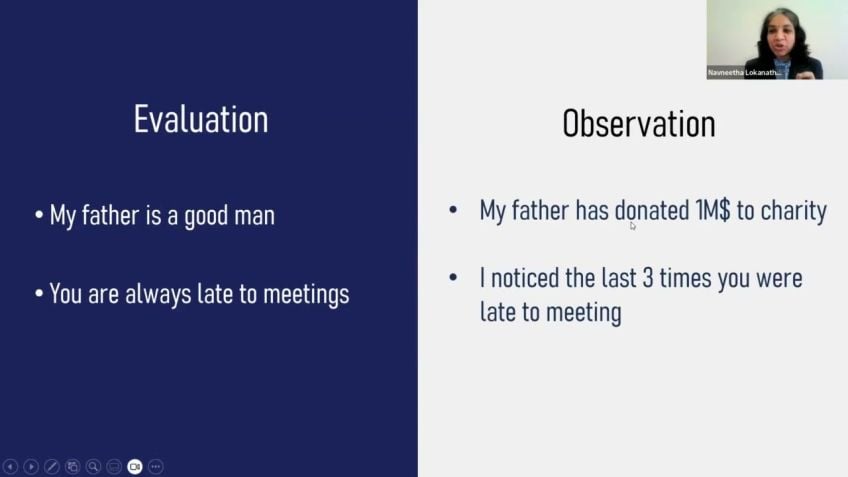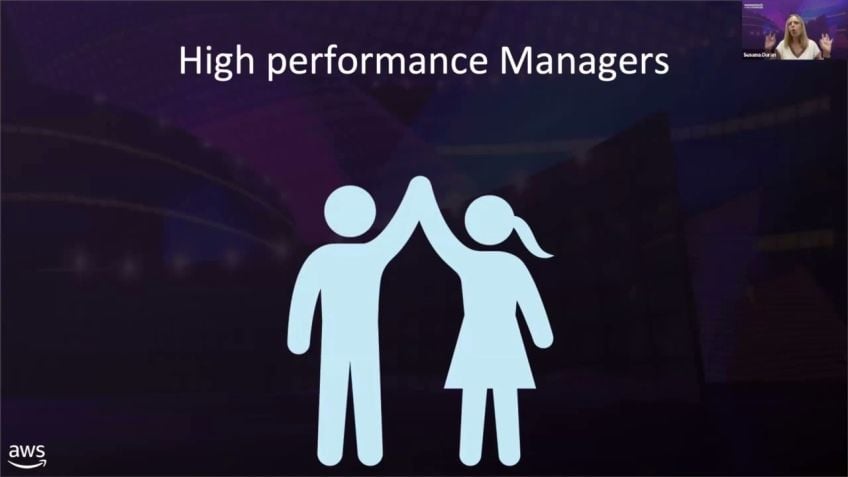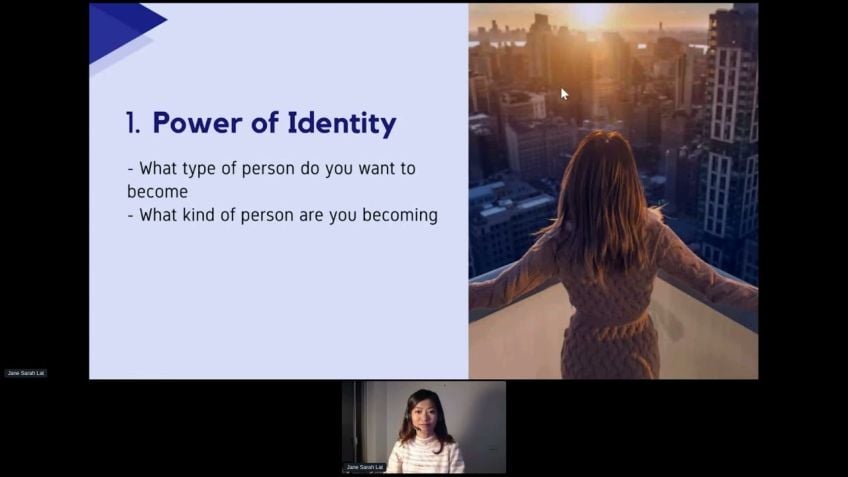Emotional Intelligence: The Core Competency to Company Success
Lauren Sweeney
Vice President of Business DevelopmentEmotional and Social Intelligence: The Game-Changers You Need!
Hello everyone and welcome! Let me start by introducing myself. I'm Natale and I'm here to reveal how emotional and social intelligence play instrumental roles in the successful growth of individuals and businesses. So, if you're curious about improving your professional and personal life, or even if you're struggling with your workplace performance despite having all the necessary technical skills, then this is the right read for you.
The journey of self-discovery
Let me take you back to the start of my own journey. As a performer touring the globe, I found myself in the coveted center stage spot but was not the best singer. I was baffled by this until I realized that it wasn't my vocal prowess that landed me that spot but something much deeper. Fast forward eight years, and as an executive of an education corporation, I found that people with phenomenal skill sets were hindering their own success by not leveraging their social and emotional prowess. That's when it hit me that professional success isn’t solely based on technical skills.
I recognized that certain traits were common among individuals and organizations that thrived more, moved further faster, and essentially, were more successful. These traits revolved around being seen, heard, and relevant, and 80% of organizational or individual success was highly dependent on their social and emotional intelligence, also known as EQ.
What does Emotional Intelligence mean to you?
Emotional intelligence, or EQ, primarily revolves around understanding and managing your own emotions, and recognizing the emotions of others. However, EQ is more than just managing emotions; it's about creating impactful, long-lasting change within yourself and your organization.
The Pillars of Emotional Intelligence
Emotional Intelligence is built on four main pillars, namely, self-awareness, self-management, social awareness and relationship management. Under these four pillars are 18 competencies that most individuals often overlook. And if you're not part of this majority, congratulations! But if you are, don't worry, let's delve right in.
Self-Awareness and Self-Management
The journey to harnessing emotional intelligence begins with being self-aware and recognizing your emotions beyond the basic seven. A more introspective dive into your feelings and emotions allows for a clearer understanding of your emotional landscape.
The ability to self-assess accurately is crucial. Your internal perception should ideally be in sync with how others perceive you. For instance, you may consider yourself approachable, while others might find you intimidating. In such scenarios, honest feedback can work wonders in realigning your perception with reality.
The third skill under the self-awareness pillar is self-confidence. Studies have highlighted that around 83% of professionals globally struggle with self-confidence, which can hinder their success significantly.
Once you've mastered self-awareness, the next step involves regulating your emotions effectively. Emotional self-control, stress management, and an optimistic mindset all form part of this pillar.
Social Awareness and Relationship Management
Social awareness revolves around understanding how to read a room, showing empathy and adding value to any social interaction. For example, if you notice that your team members lack active-listening skills or don't exhibit empathy, then it's likely they're still grappling with the emotional regulation aspect of EQ.
The final pillar, relationship management, is all about leadership – developing others, coaching, influencing and managing conflicts. However, if self-awareness and self-management aren't your strong suits, you'll struggle to influence or coach others effectively.
The Benefits of EQ
Interestingly, research shows that 80% of professional success relies heavily on mastering emotional and social intelligence. The benefits of high EQ ranges from enabling better leadership and improved customer service to honing communication skills, managing stress, and boosting self-confidence. These positive impacts extend beyond just the professional front and deeply influence personal life as well.
Conclusion
In conclusion, emotional and social intelligence are the ultimate game-changers in anyone's life. Whether you're an individual looking to advance professionally or personally, or a leader aiming to enhance your company culture, investing time in developing your EQ will undoubtedly yield results.
We're more than just our technical skills or the degrees we hold; we're social beings who need to navigate our emotions and those of others effectively. That, my friends, is the essence of emotional and social intelligence. So, get started on this game-changing journey and see the impact for yourself.
Thank you for reading and have a fabulous day ahead!
Video Transcription
Hello. Hello everyone. Welcome to the conference. My name is Natale and Aerin. Super excited to be here with you today. I'm coming all the way from Las Vegas. As you could see, it's beautiful, sunny and it's already warm.So super, super excited to be here if you don't mind, just type in the chat. Um If possible, I'm not sure if the chat is uh enabled, tell us where you're coming from. Uh Tell it what state, what country, tell us your who you are and where you're coming from. If you're able to type in the chat and if you're not, then I'll clearly see that you won't be able to. Uh Yeah, I think you should be able to. All right, cool. Very cool. So I see Netherlands, I see Ireland, Germany. Beautiful. Who else do we have here? Chicago? Fantastic. Well, it's super um it's such an honor to be here again. My name is Neal Lena Nasser De. I'm the CEO and I'm the founder of rise up for you, but I didn't always start that. Ok. So actually my first career ever was as a performer and I used to tour internationally around the world as a singer and a dancer. So I've been to Ireland, I've been to Germany, I've been to Spain, I've been to all these beautiful countries that you're putting in the chat and I used to sing.
Now, the interesting thing is is that every time I stepped into a room, right, to rehearse for a show or to audition for a short show, I always got the center stage spot. Now, if you know anything about performing, you know, that center stage is the place that you want to be because that's what we call the spotlight. Ok. But here's the thing, I was never ever the best singer. So I always got that main stage spot, but I was never ever the best singer. So I used to ask myself, why am I getting the number one spot on stage in the show? But there's four or five people that can sing me out of the water that have better technique than I have. They have a 3.5 octave range. I have a 2.5 octave range. They have parents that are celebrity singers and I sing in my garage. And yeah, I got that center stage spot now. Fast forward eight years and I become an executive of an education corporation. Ok? I am now 27 years old and I have 200 team members under my leadership and believe it or not, I see the exact same challenge happening in the corporate place.
So individuals that had phd s master's degrees, all the certificates they needed, they had all the technical skill were getting in the way of them taking the spotlight, meaning they were hindering their success. They were self sabotaging, they were getting in their own way of their potential even though they had all the skills. So it was preventing them from ever taking their spotlight or their center of the stage in their professional career, people struggling with imposture syndrome, perfectionist mindset, can anybody resonate with this? So I started to ask myself, OK, as an executive, I have all these team members that are highly qualified. OK. They have all the degrees that they need, but yet they're still not using their potential and they're getting in their own way of their success, their leadership and their communication. So I started to ask myself what makes some people more successful than others? If I have two individuals that are sitting in front of me and they have the exact same resume, the same degrees, the same technical skills, how come one's gonna move further faster if I have two organizations in front of me and they have the exact same service and the exact same product.
How come this organization is moving further faster and is making more money? What is the common denominator and with all of our research and all of our studies. And with me today as a business owner we see that around the world, all individuals and organizations just want to be seen, they wanna be heard and they wanna be relevant and 80% of an organization and an individual success is highly dependent on your social and emotional intelligence.
So tell me in the chat, what's emotional intelligence mean to you? Now, the funny thing is that many of you have heard of emotional intelligence, right? And I can even bet that the majority of you would say, yeah, emotional intelligence is when you understand your emotions and you're able to manage them. And then also you can see the emotions in other people, right? But tell me in the chat being self aware, great job Carlotta. What does emotional intelligence mean to you? Now, I am super excited to talk about this topic today because emotional intelligence unfortunately has become one of those buzzwords, right? One of those words that we see all over social media, like build your emotional intelligence, you gotta have emotional intelligence. But unfortunately, most of the narrative out there is inaccurate and you probably have a very mi minimal idea of what it really means to be emotionally and socially intelligent. But what if I told you that every season challenge that we have as human beings in our personal life and in our professional life comes down to emotional intelligence, that's diversity, equity and inclusion, that's empathy, active listening, that's coaching your team that's leading, that's being able to have motivation, that self-confidence, that all of those things are, in fact emotional and social intelligence.
So it's more than just managing your emotions is actually creating the most impactful change you can within yourself and within your organization. So I'm gonna share my screen and we're gonna dive into this and I am so excited because I'm gonna share with you today, the 18 pillars that fall under emotional intelligence that most individuals do not know about. Now, one month ago, I did a keynote for 400 educators in America 400 that were at the top of the top, meaning that they were administrators, they were principals. And when I asked how many of them knew the 18 pillars that fall under emotional intelligence, not one person raised their hand. So lucky you today, you get to learn the 18 pillars that could be the game changing skill for you in your success, not only professionally but for your entire life. So let's go ahead and jump in. Ok? Can you give me a thumbs up in the chat that you can see my screen clearly before I jump in? So you should be able to see my screen and then you should see me in the corner in my yellow sweater still.
So just give me a thumbs up in the chat that Yep, you are clear and you can see me and once I get it. Thank you, Carlotta. Awesome. Thank you Jessica Fabulous. Thank you so much. Did you see that little sticking there? I just, I threw a little bit in for you. OK. So before we jump in, allow me to reintroduce myself. My name is Natalina Nasrine. I'm the CEO and I'm the owner of rise up for you. I know you were expecting Lauren Sweeney. She's our vice president, but we are on triple duty today, meaning that we have multiple trainings and uh keynotes and stuff happening. And so I'm jumping in for her today and I'm coming from Las Vegas, Nevada, Las Vegas. We, we, so again, I'm the owner of rise up for you. And we work with or organizations and individuals around the world to enhance your potential. OK? And your leadership through all the skills that we really don't spend time on. So that is emotional and social intelligence, self-confidence, public speaking, your, your, your professional presence and being able to stand up in front of a room. All those things that we typically ignore that as I mentioned earlier are the cream of the crop for your success. OK.
So we do transformational training and coaching. We were founded in 2016 by me. We are proudly a woman owned business and we have global reach in over 50 countries. OK? And we work with individuals from around multiple industries. We've worked with Google L A Fitness Lexis, Nexis Hewlett and Packard, some of them, which I'm sure, you know. And again, we get the opportunity to be thought leaders around the world in Canada, Dubai, England, UK, Europe. Everywhere, we are super grateful for the reach that we have.
So again, we work with individuals and organizations through training and coaching to help them develop the most important skills, what I like to call the power skills, which are all the human skills that we typically don't develop, which are actually the most important for your success. OK.
So let's talk today about the most important skill that's gonna be the game changer for you and your team, if you're a leader and you run in a company and that is emotional and social intelligence. Now, I mentioned earlier research shows that 80% of your success is determined by building and mastering emotional and social intelligence. In fact, when we work with companies around the world and they have to fire somebody, you know what they tell us, they typically have to let somebody go.
Not because they don't have the technical skill, but because their emotional intelligence and their communication and their motivation and their ability to interact is just not working. Now, just type in the chat, how many of us have team members or individuals that we could see this with, right?
Maybe they're brilliant in their industry, but they just cannot hold a conversation or maybe they're brilliant in their industry, but they really have a hard time showing empathy or active listening or developing their their team or their clients. Right. How many of us have yet? A right. Absolutely.
Ok. So let's dive into a little bit more about what this looks like. So, as I mentioned, have you ever been in that situation? Somebody has everything they need to succeed and yet they're still not doing a great job. Right. That's that emotional intelligence that gets in the way. So what is it? Really? Let's break this down? OK. So yes, on a very simple level, which most of you know, because you typed in the chat, it's our ability to recognize our emotions, right? Our feelings and to be able to recognize them in others, to be able to manage our emotions and to be able to influence others. Ok? Now that influence that phrase, that's a big one. OK? Because that plays into everything it was made popular by a guy named Daniel Goldman. So if you go on the internet today and you type in emotional intelligence, he's gonna pop up. He was on Oprah Ted talks. OK? Now again, there's four pillars to emotional intelligence, right?
Or I should say four building blocks of emotional intelligence. The first two have to do with yourself that self awareness, self management. OK. So I'm aware of myself and I can manage myself. And the next two foundational blocks are social awareness and relationship management.
So social awareness is I understand how to be in a room, how to read a room how to show empathy, how to switch my body posture according to the people in the room. And then relationship management is all things leadership. But what most people don't know is this special part right here that I'm gonna share with you, which is the 18 pillars that fall under these four foundational blocks. So let's jump in. OK. And as I mentioned, 75% of careers are completely demolished because their emotional and social intelligence is not up to par. Ok? They don't elicit trust, they don't know how to have motivation, they struggle with self-confidence. So let's jump into these competencies. Foundation number one, self-awareness, three competencies under here. Now, I can talk about this for 10 hours straight, but I'm not because we don't have that time today. That's emotional awareness. So you are aware of your emotions beyond the basic seven, right? So instead of saying I'm mad, being able to say I feel frustrated because I felt unseen unheard and neglected in the meeting. Do you see how much more clear that is competency? Number two is accurate self assessment. So the way that I see myself is the way that you see me, right? So when I was an executive and I was 27 I had 200 team members under me. As I mentioned, I thought I was the most amazing leader ever. Well, guess what?
Nobody would come and talk to me. So I used to think how come no one's coming into my office to get coaching and mentoring and have a conversation with me. And then one day somebody said, well, you're kind of intimidating. And I said, no, that's not true. And then another person said, well, you're kind of intimidating. I said, no, I don't think I am. Well, I wanted to grow as a leader and as an executive. So I decided to do an anonymous survey out of 200 people, 75% said I was intimidating, not relatable. And I look mad all the time. I know tough. It, it was rough how many of you have had that situation where you've been told multiple times that you're intimidating, right? So I realized that what I was feeling and how I felt was not the way I was being seen and lastly self-confidence. My team has asked thousands of people around the world what their number one challenge is. 83% of professionals globally said self-confidence. Can you believe that self-confidence, 83% of professionals, no matter how many skills they have, no matter how many degrees they have do not feel enough. This to me is the greatest tragedy. This to me is the pandemic that we all have to work through. Now, imagine if you're struggling with self-confidence, how in the world are you gonna be able to lead your team? How in the world are you gonna be able to build professional and personal success? When up here, all you think is that you're not enough.
This is just the first foundational block of emotional intelligence and look how impactful and how much there is to learn already. Now we go into the foundation building block. Number two, self management, this is emotional self control, stress management. So when companies around the world talk about, we need well being programs and we need more wellness. No, what you need is emotional intelligence. Because this is the tool that teaches you how to manage your stress, how to regulate your emotion so that you can have more well being, right? I always say it's not about building cosmetic culture. It's about building a culture that is rooted in the, the tools and the skills that you need. Transparency, all things, integrity, the ability to adapt, achievement, meaning that you have a high sense of standard of excellence for yourself. Internal motivation, meaning that when you wake up in the morning, you get out of bed and you are ready to be your best for you. Not because of a paycheck, not for anybody else, not because you need validation because you owe it to yourself to be your best. That's internal motivation. And the last is optimism. So being able to see challenges and recognizing the challenges, not toxic positivity, but being able to find a solution. Even when it's difficult that in itself is the first component of emotional intelligence.
The first two foundational blocks that just have to do with you. And I will tell you that these nine pillars go a long way and if we can't master these well, then how the heck are we going to get to the foundation? Number three of social awareness, all
things, all things. Yes, but only two minutes left.
I know that. Thank you. I have the clock on. Thank you so much. I appreciate it. We're very good at time management here because that's part of emotional intelligence. That's
great. That's great. Thank you so much.
So, social awareness is all things, empathy, organizational and diversity and inclusion and being able to show up and add value. OK. So when you ask yourself, how come my team or my leaders, they're not active listeners, they're not empathetic. They can't understand. Well, that's because something up here in these first two pillars isn't connected, right? There's programming, there's beliefs, there's emotional regulation that's getting in the way of how they're going to show up. And lastly, it's leadership, the last pillar developing other people, coaching, being relatable, your ability to influence conflict management and teamwork. But again, if the beliefs up here aren't working and you're not able to manage your emotions, how are you gonna influence, how are you gonna motivate, how are you gonna coach other people and build the life that you deserve to have? So benefits of EQ as I mentioned, better leadership, customer service, improved communication. And I'm just talking on a professional front, not to mention, helps you build confidence, growth, mindset, stress management, motivation, public speaking, professional presence, communication, active listening, empathy coaching and leadership.
Look at all that, that it does for you. So I know that our time is out today. But if you were to ask me today, what's the number one skill that I should build? I would say emotional and social intelligence. And because I only get to spend a little bit of time with you. I have a free gift for you here. OK. This is 10 videos and 60 pages of a workbook that you can download totally for free. OK? You just have to scan that code or go to that link. And in this course, there's two courses that we're giving you. You get all of the videos on emotional intelligence, confidence, building success and professional etiquette. And you get a whole other course on building a strong company culture for all you leaders out there. It's been such a pleasure to be here with you today. Please connect with me on linkedin. If you haven't already, we have amazing content that we're always pushing out, but it's been super awesome. My name is Natale and Erine. And again, I'm with rise up for you and my puppy is joining us to end the the talk today. Thank you, everyone. Have a fabulous day and enjoy the rest of the event.






